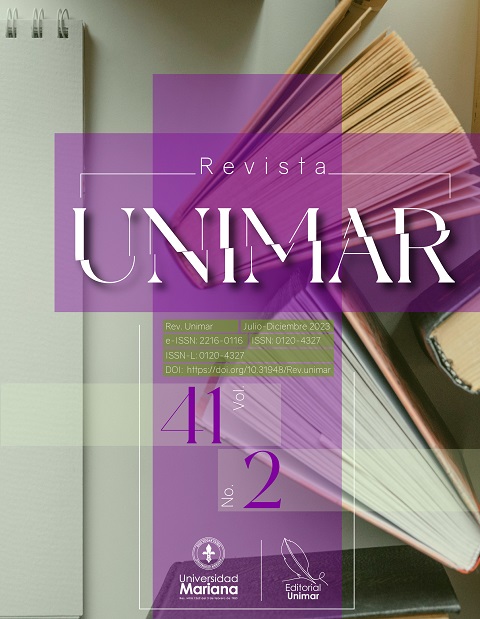Revisão sistemática sobre estresse, insônia e síndrome de burnout em professores do ensino médio
DOI:
https://doi.org/10.31948/Rev.unimar/unimar41-2-art12Palavras-chave:
estresse, burnout, professoresResumo
O objetivo deste artigo de revisão sistêmica foi analisar os sintomas de estresse, insônia e síndrome de burnout em professores do ensino médio. A metodologia PICO foi adaptada para a pergunta de pesquisa e a metodologia PRISMA para o processo de revisão e seleção de artigos. Como resultado, obteve-se que o estresse profissional ocorre quando há insatisfação ou restrições no ambiente em que ele é exercido; quando a preparação da pessoa cessou frente a uma elaboração das organizações, bem como a deterioração da vitalidade do professor devido ao estresse produzido. A síndrome de burnout é uma resposta ao estresse profissional crônico; as amplitudes que se destacam na síndrome de burnout estão relacionadas aos níveis de estresse e à insônia. Concluindo, a síndrome de burnout tende a ser mais evidente nos professores, pois eles têm contato direto com as pessoas; além disso, os fatores econômicos e políticos atuais influenciam diretamente o desenvolvimento de sua atividade diária; dessa forma, quando todos esses fatores se unem, é possível sofrer de burnout.
Biografia do Autor
Diego Rivera Porras, Universidad Simón Bolívar
Professor at Universidad Simón Bolívar, Facultad de Ciencias Jurídicas y Sociales, Cúcuta, Colombia.
Referências
Abu Dalal, H., Ramoo, V., & Chong, M. D. (2021). The impact of organizational communication satisfaction on the work commitment of health professionals. Journal of Nursing Management, 214-225. https://doi.org/10.1111/jonm.13476
Aguirre, C., Gallo, A., Ibarra, A., & Sánchez, J. C. (2018). Relación entre estrés laboral y burnout en una muestra de controladores de tráfico aéreo en Chile. Ciencias Psicológicas, 12(2), 239-248. https://doi.org/10.22235/cp.v12i2.1688
Aronsson, G., Theorell, T., Grape, T., Hammarström, A., Hogstedt, C., Marteinsdottir, I., & Hall, C. (2017). A systematic review including meta-analysis of work environment and burnout symptoms. BMC Public Health, 17(1), 1-13. https://doi.org/10.1186/s12889-017-4153-7
Beltrán, O. A. (2005). Revisiones sistemáticas de la literatura. Revista Colombiana de Gastroenterología, 20(1), 60-69.
Brownlow, J., Miller, K., & Gehrman, P. (2020). Insomnia and Cognitive Performance. Sleep Medicine Clinics, 15(1), 71-76. https://doi.org/10.1016/j.jsmc.2019.10.002
Campillo, S. (2020). Insomnio por estrés: causas, síntomas y tratamiento. https://www.vitonica.com/prevencion/insomnio-estres-como-tratarlo
Choudhury, T., Debski, M., Wiper, A., Abdelrahman, A., Wild, S., Chalil, S., & Abdelaziz, H. K. (2020). COVID-19 pandemic: looking after the mental health of our healthcare workers. Journal of occupational and environmental medicine, 62(7), e373-e376. https://doi.org/10.1097/JOM.0000000000001907
Colorado Sleep Institute. (n.d.). Sleep well. Live well. https://coloradosleep.org/
Fuller, D. T., Smith, M. L., & Boolani, A. (2021). Trait energy and fatigue modify the effects of caffeine on mood, cognitive and fine-motor task performance: a post-hoc study. Nutrients, 13(2), 412. https://doi.org/10.3390/nu13020412
Galanis, P., Vraka, I., Fragkou, D., Bilali, A., & Kaitelidou, D. (2021). Nurses' burnout and associated risk factors during the COVID‐19 pandemic: A systematic review and meta‐analysis. Journal of advanced nursing, 77(8), 3286-3302. https://doi.org/10.1111/jan.14839
Gallegos, M., & Castillo, T. (2022). Eficiencia, carga de trabajo, salud y seguridad ocupacional en la industria de la construcción en las principales ciudades del Ecuador. Revista Digital Novasinergia, 5(1), 150-162. https://doi.org/10.37135/ns.01.09.09
García-Campayo, J., Puebla-Guedea, M., Herrera-Mercadal, P., & Daudén, E. (2016). Burnout syndrome and demotivation among health care personnel. Managing stressful situations: The importance of teamwork. Actas Dermo-Sifiliográficas, 107(5), 400-406. https://doi.org/10.1016/j.adengl.2016.03.003
González, J. y Balaguer, A. (2021). Valoración crítica de artículos científicos. Parte 2: revisiones sistemáticas y metaanálisis. FAPap Monogr, 6, 14-26.
Guan, S., Xiaerfuding, X., Ning, L., Lian, Y., Jiang, Y., Liu, J., & Ng, T. B. (2017). Effect of job strain on job burnout, mental fatigue, and chronic diseases among civil servants in the Xinjiang Uygur Autonomous Region of China. International journal of environmental research and public health, 14(8), 872. https://doi.org/10.3390/ijerph14080872
Hernández, R., Fernández, C. y Baptista, P. (2014). Metodología de la investigación (6.a ed.). Editorial McGraw Hill.
Imran, N., Zeshan, M., & Pervaiz, Z. (2020). Mental health considerations for children and adolescents in COVID-19 Pandemic. Pakistan journal of medical sciences, 36, S67. https://doi.org/10.12669/pjms.36.COVID19-S4.2759
Kalmbach, D. A., Anderson, J. R., & Drake, C. L. (2018). The impact of stress on sleep: pathogenic sleep reactivity as a vulnerability to insomnia and circadian disorders. Journal of sleep research, 27(6), e12710. https://doi.org/10.1111/jsr.12710
Kuriyama, A., Shikino, K., Moriya, M., Sadohara, M., Nonaka, S., Nagasaki, K., & Makiishi, T. (2022). Burnout, depression, anxiety, and insomnia of internists and primary care physicians during the COVID-19 pandemic in Japan: A cross-sectional survey. Asian Journal of Psychiatry, 68, 102956. https://doi.org/10.1016/j.ajp.2021.102956
Lado, M. A., Otero, I., & Salgado, J. F. (2021). Cognitive reflection, life satisfaction, emotional balance and job performance. Psicothema, 33(1), 118-124.
Landa-Ramírez, E. y Arredondo-Pantaleón, A. J. (2014). Herramienta PICO para la formulación y búsqueda de preguntas clínicamente relevantes en la psicooncología basada en la evidencia. Psicooncología, 11(2-3), 259-270. https://doi.org/10.5209/rev_PSIC.2014.v11.n2-3.47387
Lee, E., Daugherty, J., Eskierka, K., & Hamelin, K. (2019). Compassion fatigue and burnout, one institution's interventions. Journal of PeriAnesthesia Nursing, 34(4), 767-773. https://doi.org/10.1016/j.jopan.2018.11.003
Lozano, J. A. (2000). El insomnio y la ansiedad. Medidas terapéuticas y tratamiento farmacológico. Offarm: Farmacia y Sociedad, 19(2), 84-92.
Martin, K., Meeusen, R., Thompson, K. G., Keegan, R., & Rattray, B. (2018). Mental fatigue impairs endurance performance: a physiological explanation. Sports medicine, 48(9), 2041-2051. https://doi.org/10.1007/s40279-018-0946-9
Martínez, O. M. (2019). Trastorno de insomnio. Consideraciones actuales. Scielo, 41(2), 483-495.
Matsuyama, Y., Nakaya, M., Leppink, J., Van der Vleuten, C., Asada, Y., Lebowitz, A. J., & Okazaki, H. (2021). Limited effects from professional identity formation-oriented intervention on self-regulated learning in a preclinical setting: a randomized-controlled study in Japan. BMC Medical Education, 21(1), 1-10. https://doi.org/10.1186/s12909-020-02460-3
Merchán-Galvis, Á. M., Matiz, A. Y., Bolaños-López, J. E., Millán, N., & Arias-Pinzón, A. A. (2018). Burnout syndrome and associated factors in medical students. Revista Cubana de Educación Médica Superior, 32(3), 172-180.
Montoya, N. P., Glaz, L. C., Pereira, L. A., & Loturco, I. (2021). Prevalence of burnout syndrome for public schoolteachers in the Brazilian context: A systematic review. International Journal of Environmental Research and Public Health, 18(4), 1606.
https://doi.org/10.3390/ijerph18041606
Ouellette, R. R., Frazier, S. L., Shernoff, E. S., Cappella, E., Mehta, T. G., Maríñez-Lora, A., & Atkins, M. S. (2018). Teacher job stress and satisfaction in urban schools: Disentangling individual-, classroom-, and organizational-level influences. Behavior therapy, 49(4), 494-508. https://doi.org/10.1016/j.beth.2017.11.011
Párraga, K. L. & Escobar, G. (2020). Estrés laboral en docentes de educación básica por el cambio de modalidad de estudio presencial a virtual. Multidisciplinaria Arbitrada YACHASUN, 4(7), 142-155. https://doi.org/10.46296/yc.v4i7edesp.0067
Pereiro, J. M. & Rodríguez, I. (2008). Estrés laboral, liderazgo y salud organizacional. Revista Papeles del Psicólogo, 29(1), 68-82.
Putwain, D. W., Loderer, K., Gallard, D., & Beaumont, J. (2020). School‐related subjective well‐being promotes subsequent adaptability, achievement, and positive behavioural conduct. British Journal of Educational Psychology, 90(1), 92-108. https://doi.org/10.1111/bjep.12266
Ramírez, A. E., Orozco, D., & Garzón, M. A. (2020). Gestión de la felicidad, bienestar subjetivo y la satisfacción laboral. Dimensión Empresarial, 18(2), 118-138. https://doi.org/10.15665/dem.v18i2.2057
Ramos-Narváez, A. D., Coral-Bolaños, J. A., Villota-López, K. L., Cabrera-Gómez, C. C., Herrera-Santacruz, J. P., & Rivera-Porras, D. (2020). Salud laboral en administrativos de Educación Superior: Relación entre bienestar psicológico y satisfacción laboral. Archivos Venezolanos de Farmacología y Terapéutica, 39(2), 237-250.
Riemann, D., Krone, L. B., Wulff, K., & Nissen, C. (2020). Sleep, insomnia, and depression. Neuropsychopharmacology, 45(1), 74-89. https://doi.org/10.1038/s41386-019-0411-y
Rivera-Porras, D. A., Carrillo, S. M., Forgiony, J. O., Nuván, I. L., & Rozo, A. C. (2018). Cultura organizacional, retos y desafíos para las organizaciones saludables. Revista Espacios, 39(22).
Rivera-Porras, D., Bonilla-Cruz, N. J., Carrillo-Sierra, S. M., Forgiony-Santos, J., & Silva-Monsalve, G. (2019). Educación para la salud laboral: Perspectivas teóricas desde la intervención. Archivos Venezolanos de Farmacología y Terapéutica, 38(5), 540-546.
Rodríguez, J. A. (2017). Síndrome de burnout en docentes. Scielo, 8(14), 45-67. https://doi.org/10.33010/ie_rie_rediech.v8i14.39
Sabio, D. C., Suárez, C., & Vargas, V. (2019). Síndrome de burnout y mala calidad del sueño. Universidad El Bosque.
Salvagioni, D. A., Melanda, F. N., Mesas, A. E., González, A. D., Gabani, F. L., & Andrade, S. M. (2017). Physical, psychological, and occupational consequences of job burnout: A systematic review of prospective studies. PloS one, 12(10), e0185781. https://doi.org/10.1371/journal.pone.0185781
Scimago Institutions Rankings. (2007). Estrategia PICO para la construcción de la pregunta de investigación y la búsqueda de evidencias. Revista Latino-americana de Enfermagem, 15(3). https://doi.org/10.1590/S0104-11692007000300023
Schonfeld, I. S., Verkuilen, J., & Bianchi, R. (2019). Inquiry into the correlation between burnout and depression. Journal of occupational health psychology, 24(6), 603.
https://doi.org/10.1037/ocp0000151
Scotta, A. V., Cortez, M. V., & Miranda, A. R. (2022). Insomnia is associated with worry, cognitive avoidance, and low academic engagement in Argentinian university students during the COVID-19 social isolation. Psychology, Health, & Medicine, 27(1), 199-214. https://doi.org/10.1080/13548506.2020.1869796
Seijas, D. E. (2019). Riesgos psicosociales, estrés laboral y síndrome burnout en trabajadores universitarios de una escuela de bioanálisis. Revista de Salud Pública, 21(1), 102-108. https://doi.org/10.15446/rsap.v21n1.71907
Sousa, C. C., Araújo, T. M., Lua, I., Gomes, M. R., & Freitas, K. S. (2021). Job dissatisfaction, psychosocial aspects, personal satisfaction, and mental health of male and female health workers. Cadernos de Saúde Pública, 37. https://doi.org/10.1590/0102-311x00246320
Sparks, K., Kavussanu, M., Masters, R. S., & Ring, C. (2021). Mindfulness, reinvestment, and rowing under pressure: Evidence for moderated moderation of the anxiety-performance relationship. Psychology of Sport and Exercise, 56, 101998. https://doi.org/10.1016/j.psychsport.2021.101998
Spiller, T. R., Weilenmann, S., Prakash, K., Schnyder, U., von Känel, R., & Pfaltz, M. C. (2021). Emotion network density in burnout. BMC psychology, 9(1), 1-9. https://doi.org/10.1186/s40359-021-00670-y
Theorell, T., Hammarström, A., Aronsson, G., Träskman Bendz, L., Grape, T., Hogstedt, C., & Hall, C. (2015). A systematic review including meta-analysis of work environment and depressive symptoms. BMC Public Health, 15(1), 1-14. https://doi.org/10.1186/s12889-015-1954-4 https://doi.org/10.1186/s12889-015-1954-4
Torres, F. G. (2021). Burnout syndrome in health professionals in Ecuador and associated factors in times of pandemic. Revista virtual de la Sociedad Paraguaya de Medicina Interna, 126-136. https://doi.org/10.18004/rvspmi/2312-3893/2021.08.01.126
Urrútia, G. y Bonfill, X. (2010). Declaración PRISMA: una propuesta para mejorar la publicación de revisiones sistemáticas y metaanálisis. Medicina clínica, 135(11), 507-511. https://doi.org/10.1016/j.medcli.2010.01.015
Van Someren, E. J. (2021). Brain mechanisms of insomnia: new perspectives on causes and consequences. Physiological reviews, 101(3), 995-1046. https://doi.org/10.1152/physrev.00046.2019
Vidotti, V., Martins, J. T., Galdino, M. J., Ribeiro, R. P., & Robazzi, M. L. (2019). Burnout syndrome, occupational stress, and quality of life among nursing workers. Enfermería Global, 18(3), 366-375. https://doi.org/10.6018/eglobal.18.3.325961
Zhang, H., Wang, J., Geng, X., Li, C., & Wang, S. (2021). Objective assessments of mental fatigue during a continuous long-term stress condition. Frontiers in human neuroscience, 15. https://doi.org/10.3389/fnhum.2021.733426
Zhao, J., Zhang, X., & Du, S. (2020). Factors associated with burnout and job satisfaction in Chinese hospital pharmacists. Medicine, 99(35). https://doi.org/10.1097/MD.0000000000021919
Como Citar
Downloads
Downloads
Publicado
Edição
Seção
Licença
Copyright (c) 2023 Revista UNIMAR

Este trabalho está licenciado sob uma licença Creative Commons Attribution 4.0 International License.
Los autores que publiquen en esta revista aceptan las siguientes condiciones:
1. Los autores conservan los derechos de autor y ceden a la revista el derecho de la primera publicación, con el trabajo registrado con la licencia de atribución de Creative Commons, que permite a terceros utilizar lo publicado siempre que mencionen la autoría del trabajo y a la primera publicación en esta revista.
2. Los autores pueden realizar otros acuerdos contractuales independientes y adicionales para la distribución no exclusiva de la versión del artículo publicado en esta revista (p. ej., incluirlo en un repositorio institucional o publicarlo en un libro) siempre que indiquen claramente que el trabajo se publicó por primera vez en esta revista.
3. Se permite y recomienda a los autores publicar su trabajo en Internet (por ejemplo en páginas institucionales o personales) antes y durante el proceso de revisión y publicación, ya que puede conducir a intercambios productivos y a una mayor y más rápida difusión del trabajo publicado (veaThe Effect of Open Access).
| Métricas do artigo | |
|---|---|
| Vistas abstratas | |
| Visualizações da cozinha | |
| Visualizações de PDF | |
| Visualizações em HTML | |
| Outras visualizações | |








